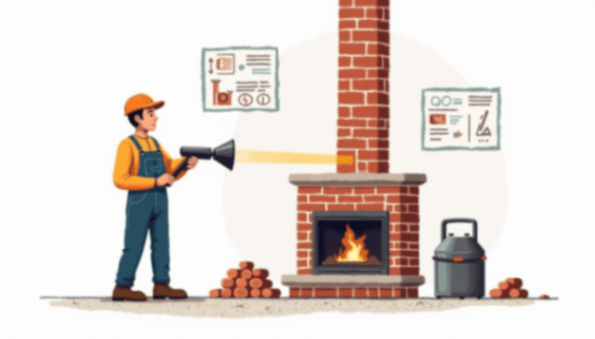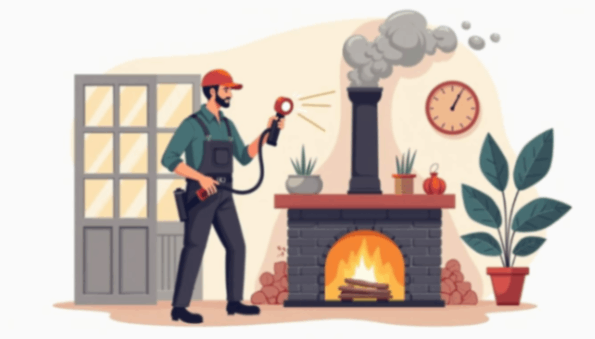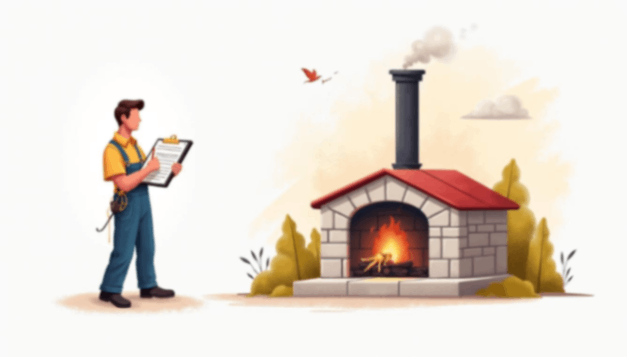Chimney inspections play an essential role in maintaining the safety and functionality of your home. Many homeowners overlook this important task, often until it’s too late. Understanding the significance of chimney inspections can help prevent severe risks, save money in the long run, and ensure a safe living environment. This article will explore what chimney inspections entail, their role in home safety, their financial implications, and how to choose the right inspection service.
Understanding Chimney Inspections
Chimney inspections are evaluations conducted to assess the condition of chimneys and their associated systems. These inspections check for blockages, structural issues, and any signs of damage that could create hazards in the home. Regular inspections can help maintain your chimney’s efficiency and safety.

What is a Chimney Inspection?
A chimney inspection involves a thorough examination of the chimney flue, chimney structure, and any appliance connecting to the chimney. Professionals look for various issues, including creosote buildup, obstructions from debris or animals, and physical damage from weather or wear. Creosote, a byproduct of burning wood, can accumulate over time and poses a significant fire risk if not addressed. Thus, understanding the importance of regular inspections can not only prolong the life of your chimney but also enhance the safety of your home.
There are three primary levels of chimney inspections, with each level providing an increasing degree of detail and analysis. Depending on the findings, a complete cleaning or repairs may be necessary to ensure safe operation. Homeowners should be proactive in scheduling these inspections, especially before the heating season begins, to prevent any potential hazards from arising during colder months.
Different Levels of Chimney Inspections
Chimney inspections typically fall into three levels as defined by the National Fire Protection Association (NFPA): Level 1, Level 2, and Level 3.
- Level 1: This basic inspection is recommended annually and includes an examination of accessible components. It is suitable for systems that have not changed; during this level, the inspector checks for clean and safe operation. Homeowners should keep a record of these inspections, as they can help establish a maintenance history that may be beneficial for insurance purposes.
- Level 2: This inspection is more detailed and is required when a change has occurred, such as the installation of a new appliance, or if there has been a chimney fire. It includes everything in Level 1 plus an assessment of components that may be hidden. This level often involves the use of video technology to inspect the interior of the flue, providing a clearer picture of any potential issues.
- Level 3: This extensive inspection is performed when serious issues are suspected. It may require the removal of parts of the chimney structure for a thorough analysis. This level is crucial for identifying hidden damage that could compromise the integrity of the chimney and the safety of the home, such as structural weaknesses or significant blockages that could lead to dangerous situations.
In addition to the inspections themselves, homeowners should also be aware of the signs that may indicate the need for an inspection. Unusual odors, smoke backing up into the home, or visible cracks in the chimney structure are all red flags that should prompt immediate professional evaluation. Furthermore, understanding the seasonal changes that can affect chimney performance, such as heavy rains or snow, can help homeowners stay vigilant about their chimney's condition and ensure that it remains in optimal working order.
The Role of Chimney Inspections in Home Safety
Chimney inspections are crucial for ensuring home safety. They help homeowners identify potential hazards early and remediate them before they develop into more significant problems.

Proper maintenance and inspections significantly reduce the risk of chimney-related accidents, protecting residents and their property from unnecessary dangers. Regular inspections not only contribute to safety but also enhance the efficiency of heating systems, ensuring that they operate optimally throughout the colder months.
Preventing Chimney Fires
One of the most critical aspects of chimney inspections is their role in preventing chimney fires. Fires can occur due to the accumulation of creosote—a byproduct of burning wood that can ignite at high temperatures. Regular inspections help to find and clean these dangerous materials, reducing the risk of combustion.
Moreover, chimney inspections can detect other potential fire hazards, such as damaged flues or chimney structure weaknesses, enabling homeowners to act proactively. Inspectors often use specialized tools to assess the integrity of the chimney, including video cameras that can reveal hidden issues within the flue that may not be visible to the naked eye. By addressing these concerns early, homeowners can save themselves from costly repairs and ensure their families remain safe.
Avoiding Carbon Monoxide Poisoning
In addition to the fire risks, poorly maintained chimneys can lead to carbon monoxide buildup. This odorless and colorless gas is deadly when inhaled in large quantities, and it can leak into the home if the chimney is obstructed.
Through regular chimney inspections, blockages can be removed, and structural issues can be addressed, ensuring that harmful gases are properly vented outside and do not pose a threat to occupants. Furthermore, inspectors often recommend installing carbon monoxide detectors in strategic locations throughout the home, providing an additional layer of safety. These detectors can alert residents to dangerous gas levels, allowing them to take immediate action to protect themselves and their loved ones. The combination of regular inspections and modern safety devices creates a comprehensive approach to home safety that every homeowner should prioritize.
The Financial Implications of Chimney Inspections
Investing in regular chimney inspections can result in significant financial benefits over time. While there is a cost associated with inspections, this expense is minor compared to the high costs associated with extensive repairs or the aftermath of a chimney fire.
Many homeowners often find it more economical to pay for preventive inspections rather than dealing with emergencies that arise from neglecting their chimney responsibility.
Cost of Regular Chimney Inspections
The cost of a chimney inspection varies based on factors such as location, chimney type, and the level of inspection performed. Typically, a basic Level 1 inspection may cost around $100-$300, while more detailed inspections could range higher.
Homeowners should remember that these costs are incredibly reasonable compared to potential repair costs from a neglected chimney or the emotional toll of safety concerns that arise from an emergency situation.
The Price of Neglecting Chimney Inspections
Neglecting chimney inspections can lead to severe financial consequences. If a chimney fire occurs, homeowners may face extensive property damage, potential injuries, and loss of valuable possessions. The cost of such unfortunate events is often much higher compared to regular preventive maintenance.
Furthermore, if a blockage leads to carbon monoxide poisoning, not only can it result in hospital bills, but it may also result in lost productivity and other indirect costs from time away from work.
How Often Should You Get a Chimney Inspection?
Determining how often you should have a chimney inspection depends on several factors, including the type of fuel used and how frequently the fireplace is used. Generally, it is recommended to have a professional chimney inspection at least once a year.

Factors Influencing Inspection Frequency
Several factors influence how often a chimney should be inspected:
- Type of Fuel: Wood-burning fireplaces require more frequent inspections due to creosote buildup, compared to gas appliances.
- Usage Frequency: Homes frequently using their fireplaces or stoves may necessitate more regular inspections.
- Age and Condition: Older or previously damaged chimneys may require increased attention.
Signs Your Chimney Needs an Inspection
Homeowners should be mindful of signs indicating that their chimney needs an inspection. These can include:
- Visible cracks or damage to the chimney structure.
- Unusual odors coming from the chimney.
- Burning smells while using a fireplace.
- Difficulty in starting or maintaining a fire.
Choosing a Chimney Inspection Service
Finding the right chimney inspection service is paramount to ensuring a thorough evaluation of your chimney. Investing time in research can save you from future headaches and expenses.
Not all chimney inspectors offer the same level of service, so it is essential to know what to look for when selecting a professional.
Qualifications to Look for in a Chimney Inspector
When considering a chimney inspection service, look for inspectors who have the appropriate certifications and experience. Ideally, they should be certified by the Chimney Safety Institute of America (CSIA) or other recognized organizations.
Additionally, always ask for references to ensure the inspector has a proven track record of satisfactory service. Reading customer reviews can also provide insights into their reliability and trustworthiness.
Questions to Ask Your Chimney Inspector
Before hiring a chimney inspection service, consider asking the following questions:
- What does the inspection process entail?
- How much experience do you have with chimney inspections?
- Can you provide references from past clients?
- Are you certified by a recognized professional organization?
By asking these questions, homeowners can feel more confident in their selection and ensure that they receive a comprehensive and reliable chimney inspection.
In conclusion, chimney inspections are a vital part of home maintenance. Understanding their importance and ensuring regular inspections can help maintain safety, prevent costly repairs, and protect families from hazardous situations. By empowering yourself with knowledge and selecting the right chimney inspection service, you can foster a secure and efficient fireplace experience in your home.










